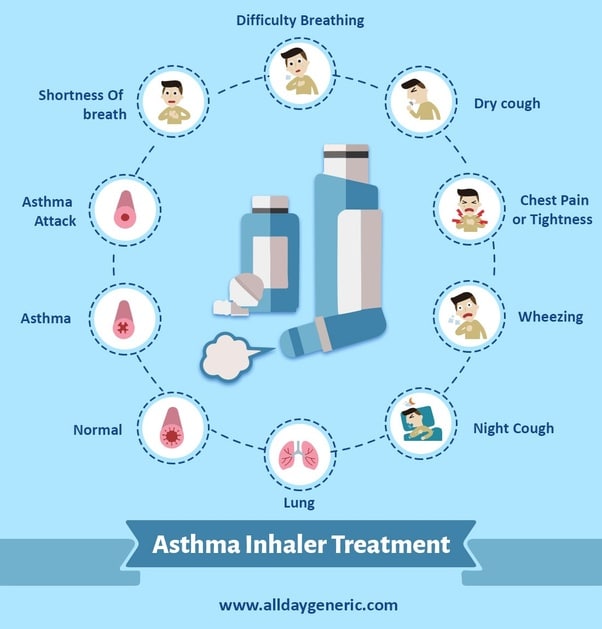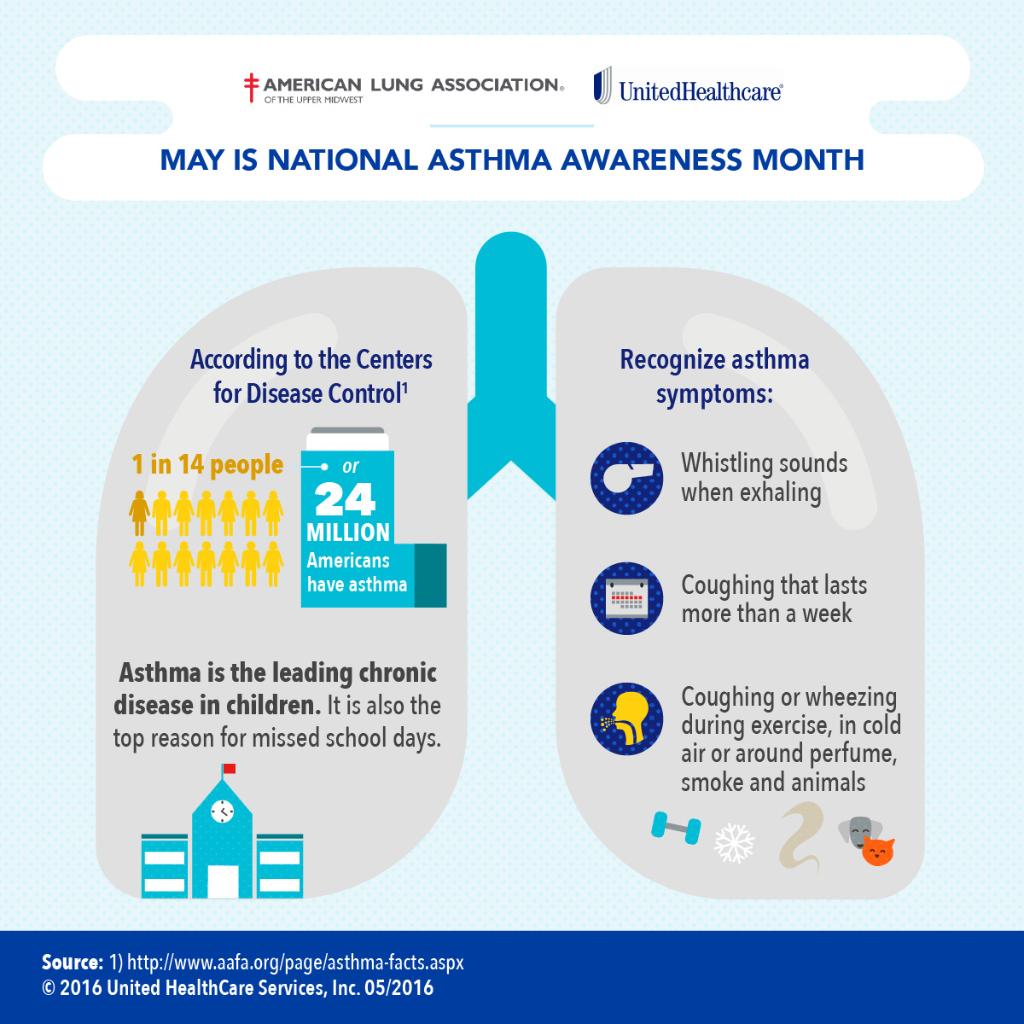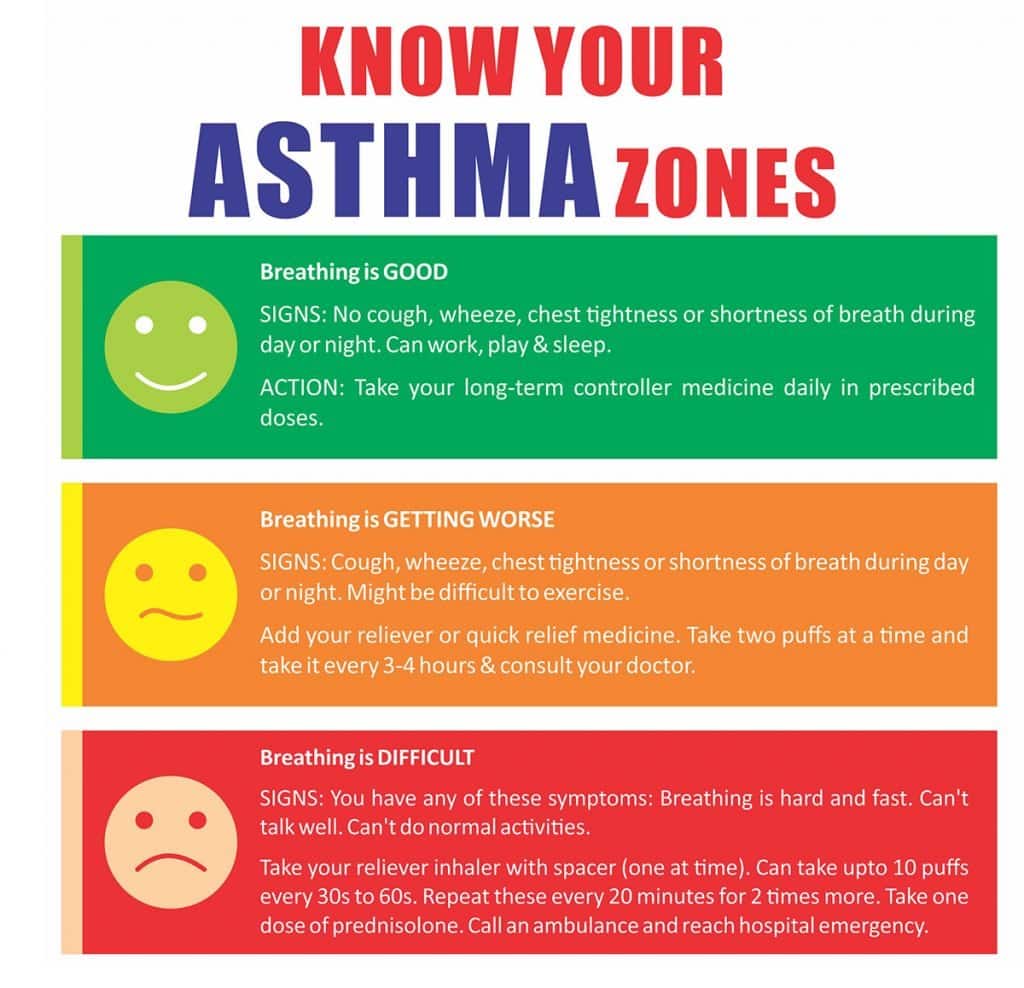Side Effects Of Relievers And Preventers
Relievers are a safe and effective medicine, and have few side effects as long as they are not used too much. The main side effects include a mild shaking of the hands , headaches and muscle cramps. These usually only happen with high doses of reliever inhaler and usually only last for a few minutes.
Preventers are very safe at usual doses, although they can cause a range of side effects at high doses, especially with long-term use.
The main side effect of preventer inhalers is a fungal infection of the mouth or throat . You may also develop a hoarse voice and sore throat.
Using a spacer can help prevent these side effects, as can rinsing your mouth or cleaning your teeth after using your preventer inhaler.
Your doctor or nurse will discuss with you the need to balance control of your asthma with the risk of side effects, and how to keep side effects to a minimum.
Diagnosing Asthma In Children
A child is more likely to have asthma if:
- A parent has asthma
- The child has allergies, including the allergic skin condition eczema
- Exposed to tobacco smoke during pregnancy or throughout childhood
- Exposed to indoor and outdoor air pollutants
- The child wheezes with viral infection
- The child is obese
To help your child’s healthcare provider make a correct diagnosis, be prepared to provide information about family history of asthma or allergies, the child’s overall behavior, breathing patterns and responses to foods or possible allergy triggers. Lung function tests are often used to make an asthma diagnosis, but they are very hard to do with young children. The doctor may use a 4- to 6-week trial of asthma medicines to see if they make a difference in your child’s symptoms.
How Is It Treated
There are two parts to treating asthma, which are outlined in your asthma action plan. The goals are to:
- Control asthma over the long term. Your asthma action plan tells you which medicine to take. It also helps you track your symptoms and know how well the treatment is working. Many people take controller medicineâusually an inhaled corticosteroidâevery day. Taking it every day helps to reduce the swelling of the airways and prevent attacks. Your doctor will show you how to use your inhaler correctly. This is very important so you get the right amount of medicine to help you breathe better.
- Treat asthma attacks when they occur. Your asthma action plan tells you what to do when you have an asthma attack. It helps you identify triggers that can cause your attacks. You use quick-relief medicine, such as albuterol, during an attack.
If you need to use the quick-relief inhaler more often than usual, talk to your doctor. This may be a sign that your asthma is not controlled and can cause problems.
Asthma attacks can be life-threatening, but you may be able to prevent them if you follow a plan. Your doctor can teach you the skills you need to use your asthma action plan.
Read Also: What Is The Best Way To Cure Asthma
Are There Any Special Considerations For Adults Who Develop Asthma
People with multiple medical conditions need to be aware of how their illnesses and the medications they use may affect one another.
If you take more than one medication, talk with your physician about ways to simplify your medication program. Explore the possibility of combining medications or using alternate ones that will have the same desired effect. Be sure to discuss potential drug interactions with anything you take including vitamins or herbal supplements.
Dont Miss: What Happens If You Have Asthma And Smoke Weed
Learn How To Easily Track Your Inhaler Usage

Sign up today to claim a Propeller device, which is a sensor and mobile app that can give you insight into your asthma condition by tracking how often you use your rescue inhaler. Having this information can help you:
Claim your Propeller when you sign up. Propeller is a sensor and mobile app that tracks when and how often you use your rescue inhaler to build a personalized asthma profile. This data can be useful to you and your doctor by:
Sign up today to get emails filled with valuable information on controlling your asthma, as well as tips for talking to your doctor and patient testimonials from others just like you. This can help you understand your current state and work toward well-controlled asthma.
To receive helpful suggestions on controlling your asthma, tips for talking to your doctor, patient testimonials from others just like you, register now. These recommendations can help you understand your level of asthma control and work toward improving it.
Have more confidence for daily activities.
Understand your symptoms and level of asthma control better .
Feel more empowered to talk to your doctor about your asthma at your next appointment.
Providing insight into your level of asthma control for you and your doctor.
Helping you learn about what your triggers may be.
When you sign up, youll also get emails filled with valuable information on controlling your asthma, additional tips for talking to your doctor, and patient testimonials from others just like you.
Read Also: How To Prevent Asthma Attacks
Side Effects Of Asthma Medication
If you are worried about possible side effects from asthma medication, speak to your doctor. Do not stop or reduce doses of medication for your child without speaking with your doctor. Common side effects from inhaled asthma medication:
Preventers
- sore mouth and throat
- fungal throat infections.
Using a spacer reduces the risk of these side effects. as does rinsing the mouth with water after using an inhaler.
Relievers
Read Also: What Foods Can Trigger Asthma Attacks
What Should I Know About Covid
If you have asthma that is moderate-to-severe, or if your asthma symptoms arent well controlled, youre at greater risk of having to be hospitalized if you get COVID-19. Therefore, you should wear a mask if you go to indoor spaces with other people, get vaccinated and avoid exposure to people who have the virus.
A note from Cleveland Clinic
Many people live fulfilling lives with asthma. Some professional athletes with asthma have set records in their sports. Your healthcare provider can help you find the best way to manage your asthma. Talk to your healthcare provider about how to control your symptoms.
Last reviewed by a Cleveland Clinic medical professional on 01/19/2022.
References
Recommended Reading: Which Allergy Medicine Is Best For Asthma
What To Do If You Have An Asthma Attack
If you think you’re having an asthma attack, you should:
Never be frightened of calling for help in an emergency.
Try to take the details of your medicines with you to hospital if possible.
If your symptoms improve and you do not need to call 999, get an urgent same-day appointment to see a GP or asthma nurse.
This advice is not for people on SMART or MART treatment. If this applies to you, ask a GP or asthma nurse what to do if you have an asthma attack.
How Can Adult Onset Asthma Be Managed
If you manage your asthma, you can expect to lead a normal lifestyle. Basically, there are four key steps to managing asthma successfully:
1. Learn about asthma and stay up-to-date on new developments.
2. Take prescribed medications. Dont make any changes until you check with your physician. Dont use over- the-counter medications unless prescribed by your physician!
3. Check your lungs daily at home by using a peak flow meter. Asthma patients often can detect lung changes with a peak flow meter before they actually experience any changes. Visit your physician regularly for further in-office tests. Lung testing is painless and provides valuable data that helps your physician make adjustments in your medication.
4. Make an asthma management plan with your physician. A plan establishes guidelines that tell you what to do if your asthma symptoms get worse.
Read Also: Does Walmart Sell Over The Counter Inhalers
You May Like: Is Asthma An Inflammatory Disease
What To Do If Your Asthma Is Poorly Controlled
If your asthma is poorly controlled you need to speak with your healthcare provider. Uncontrolled asthma is very serious and could lead to a life-threatening asthma attack. Its vital that you take your asthma seriously and recognize when your symptoms arent properly controlled. Over time, poorly controlled asthma can cause permanent damage to your airways that cannot be reversed. This is called airway remodeling. It is important to have proper treatment for your asthma to avoid this permanent damage.
If your asthma is not well controlled, talk to your healthcare provider about your symptoms. You can gain control of your asthma by:
- Taking your controller medication as prescribed to minimize symptoms and reduce inflammation in the airways
- Avoiding your personal asthma triggers as much as possible
- Carrying your reliever medication with you at all times
- Working with your healthcare provider to create an Asthma Action Plan and following it
- Discussing your asthma with your healthcare provider on a regular basis so that your asthma never becomes uncontrolled and your treatments can be adjusted if necessary.
Triggers For Asthma In Children
Asthma triggers are substances, conditions or activities that lead to asthma symptoms. These include :
- wheezing whistling noise when breathing
Your child may have all of these symptoms or just a few. Symptoms are often worse at night, in the early morning, during exercise or due to other triggers.
Also Check: Can You Give Oxygen To Asthma Patient
Can You Test Yourself For Asthma
There is no easy way to test yourself for asthma. Asthma can only be diagnosed by a doctor. You can, however, make it easier to get a diagnosis from your doctor by keeping careful track of your symptoms. Make note of when these symptoms occur and how they make you feel. Some of the most common warning signs of asthma are:
- Attacks of coughing or wheezing
- Shortness of breath
- Tightness or squeezing feeling in chest or lungs
Sometimes asthma symptoms are induced by exercise, stress, cold temperatures, specific weather, exposure to certain contaminants , or exposure to allergens. When you visit your doctor, be sure to tell them when you experience the majority of your symptoms, so they can understand what type of asthma you have.
Asthma Action Plans For Children

An asthma action plan is a clear written summary of instructions for when your childs asthma symptoms change. Everyone with asthma should have a personalised asthma action plan written by their doctor.
Your childs asthma action plan will tell you:
- how to recognise when your childs asthma is getting worse or an attack is developing, and the steps you should take to manage it
- symptoms that are serious, indicating a need for urgent medical help
- your childs asthma triggers.
Make sure you understand and can follow the asthma action plan from your doctor.
You May Like: Is Zinc Good For Asthma
Can Asthma Be Prevented
Asthma cant be prevented entirely, but there are some practical ways to reduce the risk of an asthma attack and live well with asthma.
- Get vaccinated for influenza: flu and other respiratory viruses are common triggers for asthma.
- Manage any allergies: asthma and allergies are closely linked, so treating allergic rhinitis and avoiding or managing any allergy triggers will help with your asthma.
- Live smoke-free: quit smoking if you smoke, and avoid any second-hand smoke .
- Eat well: a balanced diet helps you to maintain a healthy weight. Being overweight or obese makes asthma harder to manage.
- Care for yourself: mental health and asthma are linked, so let a trusted friend or your doctor know if you have been feeling sad or anxious, or dont enjoy things as much as before.
- See your doctor regularly: asthma needs to be regularly assessed and managed, and your medication needs may change over time. Ensure your asthma action plan is up to date by checking in with your doctor regularly.
What Asthma Treatment Options Are There
You have options to help manage your asthma. Your healthcare provider may prescribe medications to control symptoms. These include:
- Anti-inflammatory medicines: These medicines reduce swelling and mucus production in your airways. They make it easier for air to enter and exit your lungs. Your healthcare provider may prescribe them to take every day to control or prevent your symptoms.
- Bronchodilators: These medicines relax the muscles around your airways. The relaxed muscles let the airways move air. They also let mucus move more easily through the airways. These medicines relieve your symptoms when they happen.
- Biologic therapies for asthma when symptoms persist despite being on proper inhaler therapy.
You can take asthma medicines in several different ways. You may breathe in the medicines using a metered-dose inhaler, nebulizer or other inhaler. Your healthcare provider may prescribe oral medications that you swallow.
Dont Miss: Ways To Help Asthma Without An Inhaler
Recommended Reading: How Can You Tell The Difference Between Copd And Asthma
Allergic Asthma Vs Nonallergic Asthma
Allergy induced asthma is triggered by allergens in your environment. Nonallergic asthma is triggered by factors other than allergens. It may include:
- Allergic bronchopulmonary mycosis Bronchial asthma triggered by viral respiratory infections.
- Exercise-induced asthma This type of asthma is triggered by strenuous exercise.
Nonallergic asthma may also be caused by irritants in the air, stress, drugs such as aspirin, certain food additives, or changes in weather conditions.
Medical History And Physical Exam
Your doctor will ask about your risk factors for asthma and your symptoms. They may ask also about any known allergies. This includes how often symptoms occur, what seems to trigger your symptoms, when or where symptoms occur, and if your symptoms wake you up at night.
During the physical exam, your doctor may:
- Listen to your breathing and look for symptoms of asthma
- Look for allergic skin conditions, such as eczema
You May Like: How To Treat Asthma In Children Naturally
Symptoms Of Asthma Attack
Unlike early signs and symptoms, the given symptoms are more actual to know about the asthma attack.
- Speed breathing
- Problematic condition while talking
- Face turning pale
These warning could be worse if neglected. Severity intensifies rapidly. These are the certain symptoms that almost every person with asthma attack experience. Thats why, you need to be more conscious about these symptoms. Those were the clear cut symptoms that will help you to get straight answer on how do you know if you have asthma?
Only recognizing asthma attack is not well enough. Immediate treatment is required. Visiting a doctor, prescribed medication procedure should be practiced. Proper preventive measure must be adopted in order to remain protected from asthma attack.
When To Call 999
Dont delay getting help if you have an asthma attack. Call 999 if your reliever isnt helping, or lasting four hours, or youre worried at any time.
An asthma attack is a real emergency, and could be life-threatening, says Asthma UKs in-house GP, Dr Andy Whittamore.
Getting help when you need it is so important, to make sure youre treated quickly. Never think youre wasting anyones time.
You May Like: Where Is Asthma Most Common
Diagnosis Of Asthma In Children
Diagnosing asthma in children younger than 5 years can be difficult because children cough or wheeze for many different reasons. Take your child to the doctor if:
- the wheezing happens more than once with or without an illness
- constant coughing or bouts of coughing become worse at night
- you are concerned about any breathing problems in your child.
Preparing For Your Gp Appointment

A little bit of preparation can help you to get the most of your first GP appointment. It may even speed up the process so you can get diagnosed more quickly.
Have answers at the ready
Think about your family history.
- Does anyone in your family have asthma?
- Does anyone in your family have allergies?
- Do you have any allergies, including eczema or hay fever?
Your answers to these questions could help your GP work out if asthma is more likely.
Keep a diary of your symptoms
Note down how often and when you have symptoms. For example, are your symptoms worse at night, early in the morning, or when youre at work?
You could also make a note of what you think sets them off. Things that set off your asthma symptoms are called triggers. Common asthma triggers include dust mites, cigarette smoke, and exercise.
Keeping a diary or a chart of your symptoms and triggers can help your GP or asthma nurse see the pattern of your symptoms. Seeing how your symptoms are over time helps your GP to know if asthma is more likely.
Film symptoms on your phone
Asthma can come and go, so you could have no symptoms when you go and see your GP.
Try filming yourself on your phone – or ask someone else to when youre having symptoms. Then you can show the GP or asthma nurse exactly what it was like, without having to try and describe it with words.
But dont delay getting help if symptoms are getting worse though!
Jot down your questions
Read Also: How To Get Rid Of Asthma
